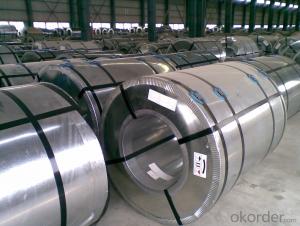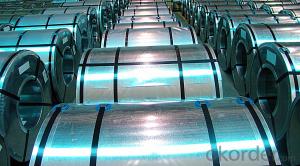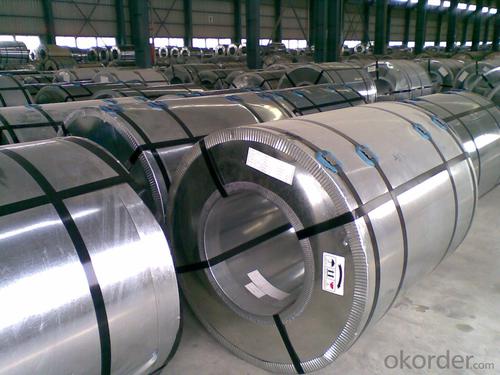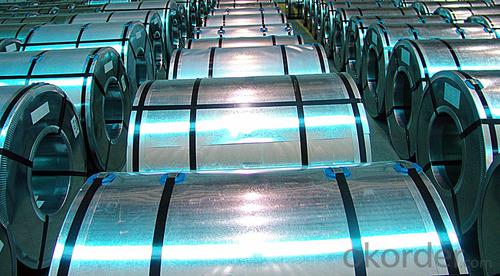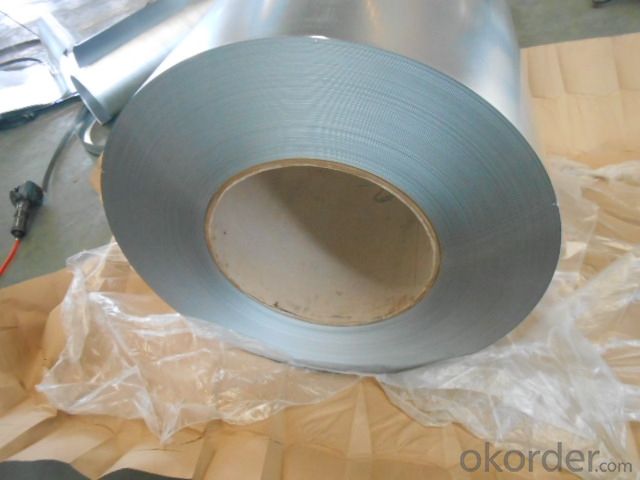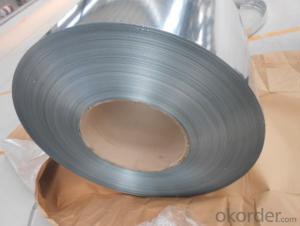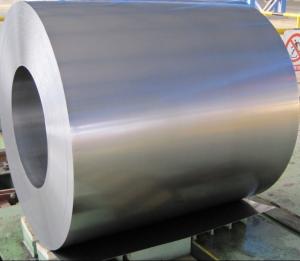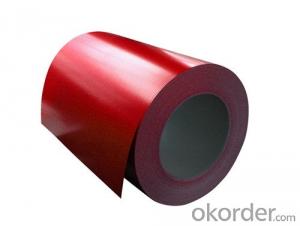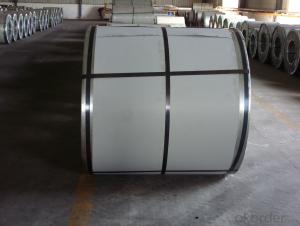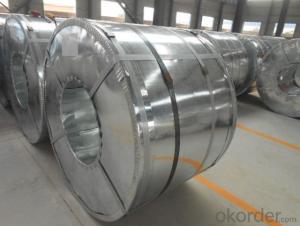ALUZINC STEEL IN COILS
- Loading Port:
- China Main Port
- Payment Terms:
- TT OR LC
- Min Order Qty:
- -
- Supply Capability:
- -
OKorder Service Pledge
OKorder Financial Service
You Might Also Like
Product Description:
General Information Of Galvalume Steel Coil AZ150
With Cold Rolled Steel as base metal,with the aluzinc coated, finally the plate steel is called galvalume steel. Galvalume steel is good capable of decoration, molding, corrosion resistance. It generally displays superior workability, durability and weather resistance.
Thickness 0.23-1.2mm (BMT) |
Zinc Coating 80-275g/m2 |
Color According to RAL color fan |
Internal Diameter 508mm or 610mm |
Coil Weight 4-8MT |
Quality Commercial and structural quality |
Paint Polyester paint for topside, epoxy for reverse |
Standard JIS G 3312, ASTM A755M, EN 10169 |
Base Steel Grade SGCC,SGCD,DX51D+Z,DX52D+Z;S200GD,S220GD, S280GD,S350GD,CS,FS,SS |
Chemical Composition Of Aluzinc Steel
C | Si | Mn | P |
0.04-0.06% | 0.01-0.03% | 0.18-0.22% | 0.014-0.016% |
Technical Data Of Prepainted Galvanized Steel
Yield Strength | (Mpa) 280-320 |
Tensile Strength | (Mpa) 340-390 |
Elongation | 20%-30% |
Reverse Impact | 9J |
T-bending | ≥2T |
Pencil Hardness | ≥2H |
Duration Of Salt Spray Test | 500 H |
Bending At 180 Degree | No crack, purling and fraction |
Application Of Aluzinc Steel
Outdoor:
roof, roof structure, surface sheet of balcony,
frame of window, door, door of garage, roller shutter door, booth, Persian blinds, cabana, etc.
In door:
door, isolater, frame of door, light steel structure of house, home electronic appliances, etc.
Packaging & Delivery Of Aluzinc Steel
Anti-damp paper inside full wrapped with plastic film, iron sheet outside on wooden pallet in 20 feet container with 25mt.
- Q: I have a set of Ben Hogan Apex Plus Forged Irons, how can i figure out if the shafts are steel or graphite?
- Steel will look like polished steel. And Graphite or CF will be painted or clear over the black CF fibers. Basically - if it looks like steel it is. You could look up you clubs on google also. Many times the shafts have the material, stiffness and other info printed right on them.
- Q: What are the different methods of surface treatment for steel coils?
- There are several different methods of surface treatment for steel coils, each with its own benefits and applications. Some of the most common methods include: 1. Hot-dip galvanizing: This is a process where the steel coil is immersed in a bath of molten zinc, which forms a protective coating on the surface. Hot-dip galvanizing provides excellent corrosion resistance and is commonly used in outdoor applications such as roofing, fencing, and automotive parts. 2. Electro-galvanizing: In this method, a thin layer of zinc is electroplated onto the surface of the steel coil. Electro-galvanizing offers similar corrosion resistance as hot-dip galvanizing, but with a thinner coating. It is often used in applications where a smooth and aesthetically pleasing finish is desired, such as appliances, electrical equipment, and automotive components. 3. Powder coating: Powder coating involves applying a dry powder to the surface of the steel coil, which is then cured under heat to form a durable and protective layer. This method provides excellent resistance to chipping, scratching, and fading, making it suitable for a wide range of indoor and outdoor applications. 4. Painting: Steel coils can also be treated with conventional liquid paint coatings, which provide both protection and aesthetic appeal. Paint coatings can be customized to meet specific requirements such as corrosion resistance, UV protection, or chemical resistance. They are commonly used in industries such as construction, automotive, and appliances. 5. Pickling and oiling: This method involves removing any scale or rust from the surface of the steel coil by dipping it in an acid solution (pickling), followed by a coating of oil to prevent reoxidation. Pickling and oiling are typically used for temporary corrosion protection during storage and transportation of steel coils. 6. Pre-painted coatings: Steel coils can be coated with pre-painted finishes at the manufacturing stage. Pre-painted coatings are applied in a continuous process, where the steel coil is passed through a coating line, and a layer of paint is applied. This method provides a wide range of colors and finishes, making it popular in the construction, automotive, and appliance industries. These are just a few of the methods commonly used for surface treatment of steel coils. The choice of method depends on factors such as the desired level of corrosion resistance, aesthetics, environmental conditions, and the specific application requirements.
- Q: What are the different types of coil slitting machines?
- There are several types of coil slitting machines, including rotary shear slitters, loop slitters, and traveling head slitters.
- Q: what are the characteristics when of iron or steel when stretched? which one could be stretched further? which one stretches more evenly?thankyou
- Steel is harder and more brittle than iron since it has impurities which disrupt the regular layers of atoms. This means that the iron will stretch further and more easily. This also means it will stretch more easily.
- Q: How are steel coils processed into finished products?
- Steel coils are processed into finished products through a series of steps, including flattening, cutting, shaping, and treating. First, the coils are unrolled and flattened to obtain a flat sheet. Then, they are cut into desired lengths and shapes using various cutting techniques. Next, the sheets are shaped into specific forms using methods like bending, rolling, or stamping. Finally, the finished products undergo treatments such as heat treatment, galvanization, or coating to enhance their durability and appearance.
- Q: How are steel coils used in the manufacturing of electrical equipment?
- Steel coils are used in the manufacturing of electrical equipment as they provide structural support and help in the efficient transfer of electrical energy. They are commonly used in transformers, motors, and generators to create magnetic fields that enable the conversion and transmission of electrical power.
- Q: Can steel coils be customized according to specific requirements?
- Yes, steel coils can be customized according to specific requirements. Manufacturers can alter the dimensions, thickness, width, and other specifications of steel coils to meet the specific needs of customers.
- Q: Is there much difference? Which is better? Are they equally safe? Is it just personal preference? Can you reccomend a good comfortable steel composite toe boot?
- steel toe boots are just that a piece of steel fitted over the toes, composite toe boots use other materials that are just as hard BUT they do not have the connectivity levels as steel. if you are working in a cold climate steel toes will freeze them toes right off, also electrical environments. my advice get a good pair of composite ones, and you get what you pay for, its worth the investment. more than you could ever imagine. proper foot support. helps legs cramps, back pain etc...
- Q: I have a steel string, Yamaha acoustic guitar that I am learning to play at home. But at school I use a rented nylon string guitar. I like the feel of the nylon strings better then the steel strings and i was wondering if i can just switch strings or if i should just get another guitar. Can anyone help?
- No, okorder /... You will want a full size or possibly a 3/4 size guitar. A 3/4 size guitar is a little smaller and will be closer in neck width to a steel string guitar. I used one like that when I started out playing when I was young. Avoid the cheap ones on Amazon that only cost $30-$50.
- Q: Do you know of any movies that featured the steel drum?
- You okorder /.. If I can find any clips, I'll add them, but I'm sure that many movies in the proper settings (Trinidad, etc.) would have such music and/or show a group or at least a single performer. For example, Cool Running could be a possibility.
Send your message to us
ALUZINC STEEL IN COILS
- Loading Port:
- China Main Port
- Payment Terms:
- TT OR LC
- Min Order Qty:
- -
- Supply Capability:
- -
OKorder Service Pledge
OKorder Financial Service
Similar products
Hot products
Hot Searches
Related keywords
